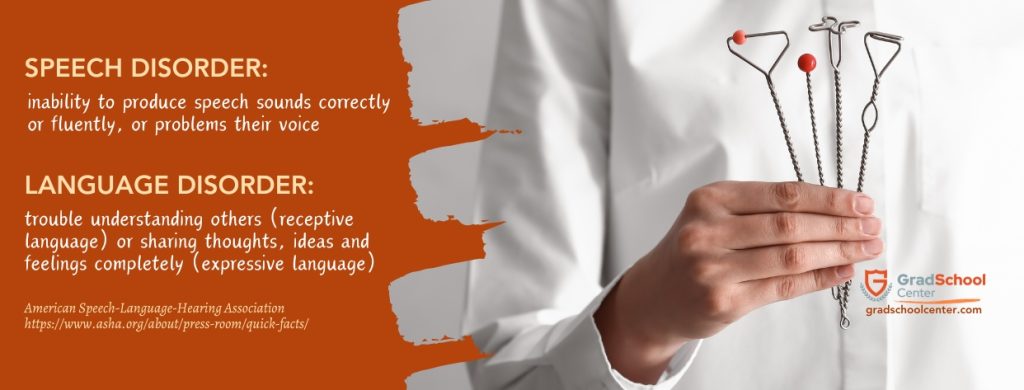What Education is Needed to Become a Speech and Language Pathologist?

As a speech-language pathologist, you’ll have the opportunity to work in a variety of settings and specialize in a variety of areas.
According to the quick statistics on voice, speech, and language done by the National Institute on Deafness and Other Communication Disorders, there are about one out of every twelve children between the ages of 3 and 17 has had an issue with their speech, language, swallowing, or voice over the past year.
Additional Resources:
- Best Online Masters of Speech Pathology Graduate Schools
- What Does a Speech and Language Pathologist Do?
- What is the Salary of a Speech and Language Pathologist?
If you plan to help these children or any human who has problems with speech and language, pursuing a speech and language pathologist career is a suitable pathway!
These professionals work with both children and adults to prevent, examine, diagnose, and treat impairments of speech, language, social communication, cognitive communication, and swallowing. Speech-language pathologists serve all ages with regard to speech and swallowing difficulties.
They are the ones that perform evaluations and diagnoses regarding speech, communication, language, and swallowing problems. They are also the ones training families and household members who can assist their members who have speech difficulties.
Educational Requirements forBecoming a Speech and Language Pathologist

But before you acquire a profession in speech and language pathology, it’s paramount to learn what the educational requirements are.
Bachelor’s Degree
The first weapon in your arsenal should be a bachelor’s degree diploma. To start down this professional route, get a bachelor’s degree. Obtaining a bachelor’s degree in communication sciences and disorders is an option for aspiring speech pathologists.
Choose a bachelor’s program that covers courses including human social behavior, linguistics, anatomy of hearing, language development, research techniques, and language disorders. All these will help you become a well-rounded speech and language pathologist.
Other than a bachelor’s degree in communication sciences, it’s possible to study anything related to this degree. For instance, you can study psychology, linguistics, or English or acquire other majors. The advantage of choosing such degrees is that you’ll have a general and more broad education that allows you to transition professions later on.
At the same time, you can combine them with a concentration on communication sciences and disorders or a clinical speech and language pathology major.
Master’s Degree
After fulfilling a bachelor’s degree, it’s natural to advance your degree and enroll in a master’s degree. It’s important to choose a graduate program that is recognized or approved by the Council on Academic Accreditation in Speech-Language Pathology and Audiology.
Fortunately, there are many programs offered by universities and colleges now offering high-caliber professors and curricula.
Choose to get a master’s degree in Speech-Language Pathology or Communication Science and Disorders. Ensure that your career and professional goals match the master’s program.
Most graduate programs in Speech-Language Pathology involve 60 credit hours of coursework, while the precise curriculum varies from program to program. However, some coursework to expect in these master’s degrees are language disorders, speech and sound disorders, advanced neurological basis of communication disorders, phonology, and dysphagia.
You can also expect to have dissertations, research projects, and internships in some master’s degree programs. Before enrolling in a graduate program, you must complete the prerequisites for that program. Hence, it’s crucial to seek advice from the admission staff and inquire early before enrollment.
Fellowships or Internships
As mentioned, both the bachelor’s and master’s degrees may or may not include fellowships and internship opportunities. But if it does come with it, it’s best to apply for it, as this can be valuable or necessary for licensure. ASHA-certified and licensed speech pathologists will supervise and guide the candidate during the fellowship, a term of hands-on instruction.
Both fellowships and internships may be quite beneficial to your professional path, especially in the early and mid stages of your career. Despite the frequent confusion between the phrases “fellowship” and “internship,” there are a few important distinctions between the two, including the application procedure, the intended candidate, the experience, and the salaries you receive.
The duration of fellowships and internships may vary depending on the state you live in, but most states require that they be 36 weeks or 1,260 hours long, with 80% of this time spent with patients during evaluations, diagnosis, and treatment.
To complete your fellowship, you may need a temporary one-year state license. The master’s degree and a clinical fellowship plan signed by your licensed supervisor are required to apply for this license.
State Licensure
Since the license is only temporarily acquired for the sake of fellowship or internship, it’s now time to apply for state licensure in order to be able to practice being a licensed speech and language pathologist. It’s best to inquire early on about the requirements necessary in your state.
Certain states also have additional criteria, such as completing a test on the laws and regulations of the state. You can fulfill your state’s renewal criteria in order to maintain your speech pathologist license.
It’s also crucial to remember that in order to practice in any state, you must apply for a license. This means having a license in Washington state will only qualify you to practice in that state and nowhere else. This implies that if you want to practice in two states at one time, you need to acquire licenses for both states.
Along with applying for state licensing, especially the Speech-Language Pathology Certificate of Clinical Competence, many speech and language pathologists will also apply for accreditation through ASHA.
In general, it is advised that you seek and maintain certification even if it is not necessary because it is a significant professional accomplishment.
Advance More
After fulfilling your educational requirements and licensures, it’s natural to consider advancing your profession through specializations and further studies. After all, advancing your credentials will open more doors of opportunities for public service and personal growth.
Also, in many states, SLPs are required to complete continuing education hours in order to maintain their licensure. Continuing education is also required to maintain certification with ASHA.
Even when it’s not required, pushing yourself to finish additional courses will enable you to keep current with industry trends and advancements. As a consequence, you will be able to treat your patients more effectively.
By completing further tests, speech pathologists can also get board certification as specialists. Another benefit is that acquiring a Ph.D. and the development of a specialty can increase a speech pathologist’s earning potential.
How to Choose the Best Program for Speech Pathology Studies

Determining which among the hundreds of recognized bachelor’s or master’s programs in speech pathology around the nation is best for you could be difficult. It’s essential to list down your goals before starting your selection process.
After that, it’s best to consider a list of the best programs in speech and language pathology so you can easily narrow them down while you match them with your goals. Remember that the crucial first step on the road to becoming a speech-language pathologist is deciding which speech-language pathology program is right for you.
Researching various alternatives is also equally essential to planning the future in speech and language pathology, so this is where you include alternative majors like English, psychology, and so on.
The following factors should be taken into account during your selection process:
- Cost
- Quality of curriculum
- Financial aid resources
- Specialization choices
- Class formats such as online, face-to-face, or hybrid
- Admission requirements
- Clinical requirements
You may enroll in a speech pathology program, either full-time or part-time, and work at your speed to finish it. Depending on the state, you may also need to complete supervised clinical training and pass an exam to obtain your license on top of the prerequisite courses.
How can you be a Speech Pathologist right away?
Generally speaking, you will need some years in order to become a licensed speech pathologist. This is primarily because undergraduate and graduate education is required for this profession. Following that, candidates must pass the CCC-SLP examination and complete a 36-week fellowship under the guidance of an expert in speech pathology.
For the exam, you may need to spend additional time studying. After completing these steps, applicants may need to complete practical work experience. While you can be focused on being a speech pathologist right after graduation, it will take some years before you finally do so.
Is it possible to be a Speech Pathologist without an education degree?
The short answer to this question is no. Speech pathologists would even need a master’s degree to practice and be licensed. The field of speech pathology requires ample specific expertise to provide adequate assistance to patients. Earning a graduate degree will provide the best salary options for the best job opportunities.
Instead of a master’s, those with a bachelor’s degree (in a related field) could work in public policy, education, or health—disciplines that are related to speech pathology. They may also find roles in the medical sector in a similar field, helping audiologists in their offices or working as a speech pathologist’s assistant.
How do you find graduate programs in Speech Pathology?
There are several considerations to ponder while choosing between graduate SLP programs that are less competitive. The number of applications received by different SLP programs may have an impact on your chances of acceptance. Finding out the minimum criteria for admission to each program you are applying to will help you tailor your application.
Do note that you will be required to have a bachelor’s degree in any related field before you can proceed to a graduate degree. In the event that you have a bachelor’s degree in an unrelated major, you will need to complete their prerequisite courses.
A GRE score is necessary for certain traditional and online SLP programs. You could improve your chances of getting a good score by studying on your own or by participating in an organized program.
Other master’s programs also require work or internship experiences. Before you begin your degree, experience allows you to acquire important information and skills, thus helping you stand out from other applicants.
There are many other career opportunities to consider if you would like to assist others who are dealing with adversity. Such programs include careers in Autsim and earning a master’s in occupational therapy or special education, to name a few.
In addition, think about earning an online Master’s in ABA Therapy. An ABA therapist has a plethora of opportunities to help others, too!





